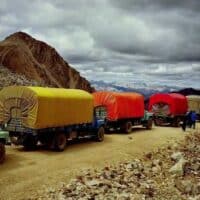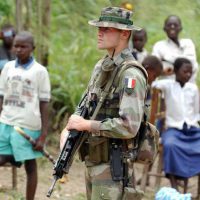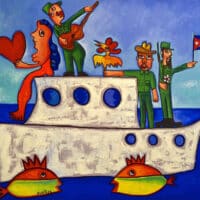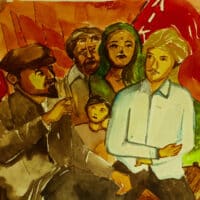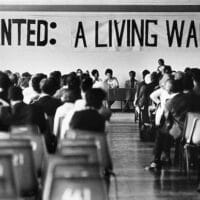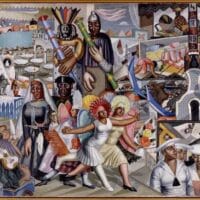-
On the Threshold of a New International Order
In the current global climate of conflict and division, it is essential to develop lines of communication and encourage exchange between China, the West, and the developing world.
-
China’s historical destiny is to stand with the Third World: The Thirteenth Newsletter (2023)
On 20 March 2023, China’s President Xi Jinping and Russia’s President Vladimir Putin spent over four hours in private conversation.
-
You strike the women, you strike the rock, you will be crushed: The Twelfth Newsletter (2023)
What constitutes a crisis worthy of global attention? When a regional bank in the United States falls victim to the inversion of the yield curve (i.e., when short-term bond interest rates become higher than long-term rates), the Earth nearly stops spinning.
-
Birth again the dream of Global peace and mutual respect
On 24 February 2023, the Chinese Foreign Ministry released a twelve-point plan entitled ‘China’s Position on the Political Settlement of the Ukraine Crisis’.
-
Eight contradictions of the imperialist ‘rules-based order’
The Bulletin of the Atomic Scientists has now moved the Doomsday Clock to 90 seconds to midnight, the closest it has been to the symbolic time of the annihilation of humanity and the Earth since 1947.
-
Those who die for life–like Hugo Chávez–cannot be called dead: The Ninth Newsletter (2023)
On 28 October 2005, a special event was held in Caracas at the National Assembly of the Bolivarian Republic of Venezuela. At this gathering, held on the birthday of Simón Rodríguez (Simón Bolívar’s teacher), the Venezuelan government announced that nearly 1.5 million adults had learned to read through Mission Robinson.
-
The true test of a civilisation is the absence of anxiety about health: The Eighth Newsletter (2023)
I was reminded of the Carlos Marx Hospital by the newest edition in our series Studies on the DDR, jointly produced by Tricontinental: Institute for Social Research and the Internationale Forschungsstelle DDR (IFDDR) and entitled ‘Socialism Is the Best Prophylaxis’: The German Democratic Republic’s Health Care System.
-
The French are going, but the war in the Sahel continues
Captain Ibrahim Traoré, who leads the Burkinabé government, came to power through a coup d’état in September 2022. He ousted Lieutenant Colonel Paul-Henri Sandaogo Damiba, who had himself come to power through a coup in January 2022. Neither of these coups was a surprise.
-
Rescue collective life by reading a Red Book: The Seventh Newsletter (2023)
‘The world is rapidly being globalised’, Castro told the Cuban youth, and this globalisation was ‘an unsustainable and intolerable world economic order’ founded on the cannibalisation of nature and the brutalisation of social life.
-
Chomsky and Prashad: Cuba is not a state sponsor of terrorism
In the last days of the Trump administration, the U.S. government returned Cuba to its state sponsors of terrorism list. This was a vindictive act. Trump said it was because Cuba played host to guerrilla groups from Colombia, which was actually part of Cuba’s role as host of the peace talks.
-
The United States wants to make Taiwan the Ukraine of the East: The Sixth Newsletter (2023)
On 2 February 2023, President Ferdinand Marcos Jr. of the Philippines met with U.S. Defence Secretary Lloyd Austin at Malacañang Palace in Manila, where they agreed to expand the U.S. military presence in the country.
-
The Requirements of the European Left: A Conversation with Peter Mertens, General Secretary of the Workers Party of Belgium
Vijay Prashad in conversation with Peter Mertens, General Secretary of the Workers Party of Belgium.
-
The question of the civilizational state: an interview at Guancha with Vijay Prashad
Following the interviews with Zhang Weiwei, director of the China Institute at Fudan University, and Martin Jacques, former senior fellow of the Department of Politics and International Studies at Cambridge University, Guancha.cn (观察者网) invited Vijay Prashad, executive director of the Tricontinental: Institute for Social Research, to continue the discussion on the “civilizational state”.
-
Writing about a joy that invades Jenin: The Fifth Newsletter (2023)
Israel calls its latest military campaign Operation Break the Wave, a lyrical description of a brutal reality.
-
It was the workers who brought us democracy, and it will be the workers who establish a deeper democracy yet: The Fourth Newsletter (2023)
Democracy has a dream-like character. It sweeps into the world, carried forward by an immense desire by humans to overcome the barriers of indignity and social suffering.
-
When the people have nothing more to eat, they will eat the rich: The Third Newsletter (2023)
On 8 January, large crowds of people dressed in colours of the Brazilian flag descended on the country’s capital, Brasília. They invaded federal buildings, including the Congress, Supreme Court, and presidential palace, and vandalised public property.
-
The winds of the New Cold War are howling in the Arctic Circle: The Second Newsletter (2023)
In 1996, the eight countries on the Arctic rim—Canada, Denmark, Finland, Iceland, Norway, Russia, Sweden, and the United States—formed the Arctic Council, a journey that began in 1989 when Finland approached the other countries to hold a discussion about the Arctic environment.
-
Socialism is not a Utopian ideal, but an achievable necessity: The First Newsletter (2023)
In May 2021, the executive director of UN Women, Phumzile Mlambo-Ngcuka, and the UN high representative for disarmament affairs, Izumi Nakamitsu, wrote an article urging governments to cut excessive military spending in favour of increasing spending on social and economic development.
-
The hope of a pan-African-owned and controlled electric car project is buried for generations to come
The United States government held the U.S.-Africa Leaders Summit in mid-December, prompted in large part by its fears about Chinese and Russian influence on the African continent.
-
The perils of Pious Neoliberalism in the Austerity State: The Fifty-First Newsletter (2022)
The International Labour Organisation’s Global Wage Report 2022–23 tracks the horrendous collapse of real wages for billions of people around the planet.


